Conscious Leadership
Insert (CLP) Photograph on Web Page (Align Right)
The Appleton Greene Corporate Training Program (CTP) for Conscious Leadership is provided by Mr. Liversage Certified Learning Provider (CLP). Program Specifications: Monthly cost USD$2,500.00; Monthly Workshops 6 hours; Monthly Support 4 hours; Program Duration 12 months; Program orders subject to ongoing availability.
Personal Profile
To request further information about Mr. Liversage through Appleton Greene, please Click Here.
(CLP) Programs
Appleton Greene corporate training programs are all process-driven. They are used as vehicles to implement tangible business processes within clients’ organizations, together with training, support and facilitation during the use of these processes. Corporate training programs are therefore implemented over a sustainable period of time, that is to say, between 1 year (incorporating 12 monthly workshops), and 4 years (incorporating 48 monthly workshops). Your program information guide will specify how long each program takes to complete. Each monthly workshop takes 6 hours to implement and can be undertaken either on the client’s premises, an Appleton Greene serviced office, or online via the internet. This enables clients to implement each part of their business process, before moving onto the next stage of the program and enables employees to plan their study time around their current work commitments. The result is far greater program benefit, over a more sustainable period of time and a significantly improved return on investment.
Appleton Greene uses standard and bespoke corporate training programs as vessels to transfer business process improvement knowledge into the heart of our clients’ organizations. Each individual program focuses upon the implementation of a specific business process, which enables clients to easily quantify their return on investment. There are hundreds of established Appleton Greene corporate training products now available to clients within customer services, e-business, finance, globalization, human resources, information technology, legal, management, marketing and production. It does not matter whether a client’s employees are located within one office, or an unlimited number of international offices, we can still bring them together to learn and implement specific business processes collectively. Our approach to global localization enables us to provide clients with a truly international service with that all important personal touch. Appleton Greene corporate training programs can be provided virtually or locally and they are all unique in that they individually focus upon a specific business function. All (CLP) programs are implemented over a sustainable period of time, usually between 1-4 years, incorporating 12-48 monthly workshops and professional support is consistently provided during this time by qualified learning providers and where appropriate, by Accredited Consultants.
Executive summary
Conscious Leadership
The challenge we face
A recent study released in 2021 by CareerAddict, of 1000 workers found that 79% would consider bad leadership as a factor in deciding to quit.
The trend toward quiet quitting is spreading virally on social media that millions of people are not going above and beyond at work and just meeting their job description, could get worse. This is a problem because most jobs today require some level of extra effort to collaborate with co-workers and meet customer needs. Quiet quitters make up 50% of the US workforce Gallup has found and employee engagement took another step backward during the second quarter of 2022, with the proportion of engaged workers remaining at 32% but the proportion of actively disengaged increasing to 18%. The ratio of engaged to actively disengaged employees is now 1.8 to 1, the lowest in almost a decade.
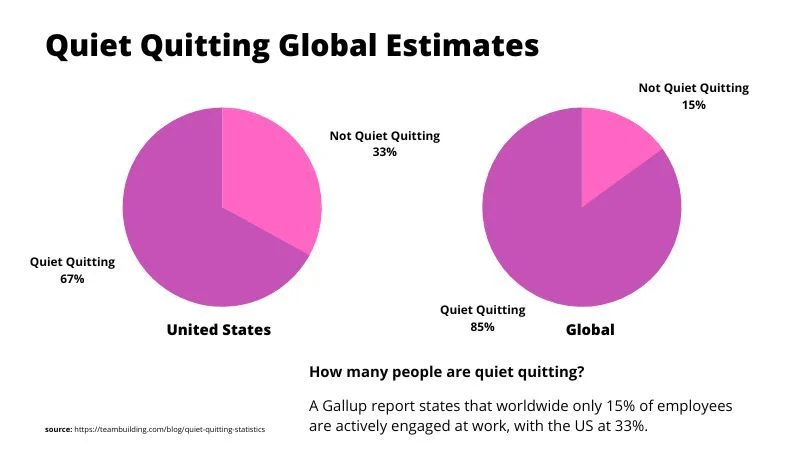
This is why I get out of bed in the morning! As a People & Culture Development expert, I have been privileged to work with some great leaders and have worked with some amazing organisational cultures. Sadly, I have also seen the opposite side of the coin and the data above really worries me. I passionately believe it is our responsibility to ensure that those who lead our organisations are creating environments where their teams can thrive and deliver great results. Places where leaders are self-aware and mindful of the impact of their behaviour has on teams. Places where people feel, seen, heard and valued. As leadership research psychologist Brene Brown puts it “A brave leader is someone who says I see you. I hear you. I don’t have all the answers, but I’m going to keep listening and asking questions”.
A Paradigm Shift
Conscious leaders act with integrity, lead with authenticity and hold themselves accountable. They listen with the intent to understand rather than react and they do it by being in tune with themselves and the world around them. The last century model of command-and-control leadership has become outdated for the modern workplace. Younger generations are wanting more flexibility, having different expectations of the workplace and seeking meaningful work for organisations with real purpose and vision. But Baby Boomers and Generation X are also now re-examining their relationship with work following the huge disruption of the last three years. Creating a new leadership paradigm is of vital importance or we face a huge talent drain as people get disillusioned and leave to join smart companies or start their own business.
Ensuring we have authentic leaders who are not afraid to share their own vulnerably and humanity, who walk the talk with emotional intelligence and build trust with peers and within their teams is of paramount importance. In such a VUCA world creating a culture where people feel safe to be who they really are and are not afraid to fail is critical to attracting, developing and keeping their talent.
Covid 19 caused a cataclysmic shift in how we work. Hybrid working is the new normal for many and we are shifting to assessing performance based on quality of output, rather than how long employees are sat at a desk. But this presents its’ own challenges for cultural evolution as people mobilise across different work settings and across time zones. How do we create that sense of belonging that is so vital to a cohesive culture of shared vision and values?
This has presented us with a window of opportunity to reset and upgrade our leadership DNA to another level. The time is right for shifting our awareness to a higher state of consciousness. Insights from neuroscience show that we are capable of more than we ever imagine as we learn to better manage our brains, connect to ourselves in new ways and connect on a very human level to those we work with and lead.
The Solution
The conscious leadership programme is born out of this shift and supported by over my 30 years of experience working across different organisations, coaching and supporting leaders to board level. It’s informed by the latest frameworks and tools for state-of-the art-leadership, is highly practical and built to grow leaders in situ, dealing with live challenges as they unfold rather than lost in the dogma of complex theory.
The Programme will run over 12 months comprising 3 modules with 12 one day, monthly workshops in total.
• Looking inwards; self-awareness and insight, evolving personal leadership style, creating a healthy mindset and connecting to purpose
• Looking outwards; building trust, empathy and EI, Creating a more conscious culture. Nurturing wellbeing and its impact on performance
• Organisational impact and sharing best practice internally
This will be supported with action learning groups solving real business and people leadership challenges along the way. Each participant will be also provided with an Enneagram profile with some coaching to give them deep understanding of themselves and how they relate to others. The Enneagram is a system of personality which describes people in terms of nine archetypes, each with their own motivations, fears and internal dynamics.
Outcomes
By the end of this program participants will:
• Have more understanding of who they are and how they impact on those they lead
• Understand their natural and flex leadership styles
• Have more control over their mindset using mindfulness/brain training techniques and growth mindset
• Be able to build deeper trust and connection with peers and teams they lead
• Have the tools to elevate emotional intelligence to a higher level of awareness
• Be more conscious of their sense of purpose and how to nurture that in others
• Have the know-how to create a high performing culture, based on wellbeing and preventing burnout
• Have more authentic non-ego-based power to influence across the organization
• Be able to share the learning with others
Case Studies
Conscious leadership is a philosophy and approach to leadership that emphasizes being aware of one’s own thoughts, feelings, and actions, as well as the impact of these on others. Many organizations are incorporating conscious leadership principles into their corporate culture to create a more positive and productive work environment. The proof is in the pudding, so below are a few examples of organizations that practice conscious leadership. The philosophy is becoming increasingly popular as more companies recognize the benefits of creating a more mindful and empathetic workplace culture.

• Google: Google has a strong emphasis on developing leaders who are self-aware and empathetic. The company’s focus on mindfulness and emotional intelligence is a key component of its conscious leadership approach.
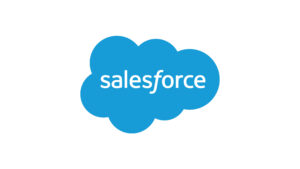
• Salesforce: The cloud-based software company is a strong advocate of conscious leadership and has implemented several programs to promote the philosophy among its employees. These programs focus on developing leadership skills, fostering teamwork, and promoting a positive workplace culture

• Patagonia: The outdoor clothing and gear company is known for its commitment to sustainability and social responsibility. The company’s leaders practice conscious leadership by considering the impact of their decisions on both the environment and their employees.
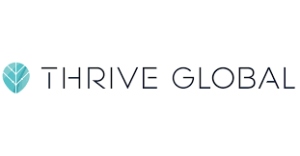
• Arianna Huffington, Co-Founder of The Huffington Post: Arianna Huffington is a well-known conscious leader and a champion for workplace wellness. In addition to co-founding The Huffington Post, she is also the founder and CEO of Thrive Global, a company that helps individuals and organizations prioritize well-being and reduce stress. Huffington is a strong advocate for the importance of sleep, meditation, and mindfulness in the workplace, and has made these practices a priority in her own life and work.

• Zappos: The online retailer is famous for its unique corporate culture, which is built on the principles of conscious leadership. Zappos’ leaders emphasize the importance of empathy, compassion, and open communication in creating a positive work environment. It is known for its commitment to corporate responsibility and employee happiness. The company’s CEO, Tony Hsieh, has made it a priority to create a fun, quirky, and collaborative work environment. Zappos also has a strong commitment to community service and charitable giving.

• Tim Cook, CEO of Apple: Tim Cook has been recognized as a conscious leader for his strong stance on social and environmental issues. Under his leadership, Apple has become one of the largest renewable energy users in the world and has taken steps to minimize its carbon footprint. Cook has also been an advocate for human rights and has spoken out against government surveillance and data privacy concerns.

• The Container Store: This retailer is dedicated to creating a positive work environment for its employees and has been recognized as one of the “100 Best Companies to Work For” by Fortune magazine. The Container Store prioritizes employee training and development, fair wages, and flexible scheduling.

• Howard Schultz, former CEO of Starbucks: Schultz is known for his commitment to social responsibility and sustainability. During his time as CEO, Starbucks became one of the first companies to offer healthcare coverage to its part-time employees, and it established the Starbucks Foundation to support education and community development initiatives. Schultz has also been a vocal advocate for diversity and inclusivity in the workplace and has taken steps to address social and environmental issues through the company’s supply chain practices.
.
These are just a few examples of conscious leadership in action. By prioritizing the well-being of employees these companies are setting a positive example for others to follow.
Curriculum
Conscious Leadership – Part 1 – Year 1
- Part 1 Month 1 The Conscious Leader – Programme Introduction and Overview
- Part 1 Month 2 Self-awareness and Self-insight
- Part 1 Month 3 Evolving Your Leadership Style
- Part 1 Month 4 Setting your Purpose and Mindset
- Part 1 Month 5 Building Trust, Empathy and Emotional Intelligence
- Part 1 Month 6 Action Learning Groups – Insights
- Part 1 Month 7 Creating a More Conscious Environment and Culture
- Part 1 Month 8 Nurturing Wellbeing and Performance
- Part 1 Month 9 Impacting your Organisation
- Part 1 Month 10 Learning Review, Knowledge Gaps and Maintaining Momentum
- Part 1 Month 11 Creating your Personal Manifesto and Legacy
- Part 1 Month 12 Developing a Process to Share Learning
Program Objectives
The following list represents the Key Program Objectives (KPO) for the Appleton Greene Conscious Leadership corporate training program.
Conscious Leadership – Part 1 – Year 1
Conscious Leadership is an introspective course aimed at increasing self-awareness, emotional intelligence and authentic leadership through elevated consciousness. I passionately believe that leaders in all levels of an organisation should be creating and nurturing an environment where their teams can thrive and deliver optimised outcomes and results with a balanced sense of wellbeing.
This programme will be over the course of a year and blended; online teaching, interactive 1-day monthly workshops to explore the learning and action learning groups to activate. The programme will be supported with a workbook and resources (TED talks, podcast, HBR articles etc.) and coaching sessions with accredited coaches. The latest research from neuro-leadership and mindfulness will be used as a core methodology.
The learning objectives are:
• To increase self-awareness; understanding strengths, default leadership style, purpose and values and how these impact the teams they are leading
• To learn adaptive styles of leadership based on neuroscience
• To raise emotional intelligence, perception field and self-management
• To cultivate and communicate a clear purpose to teams and the organisation (in alignment with organisational purpose)
• To identify and clear personal energy blocks and psychological barriers
• To develop strategies for maintain self and team wellbeing
• To identify role model behaviours and ways to exemplify
• To influence the philosophy of the organisation by impacting the vision, climate change and sustainability etc.
The structure will be translated into a clear process that can be rolled out across the organisation and adapted to all levels with people responsibilities.
Program Objectives
The programme will be made up of 12 modules across 12 months
Each participant will:
• Receive pre-work (video’s, research papers and articles) 2 weeks prior to each module (2 hours learning time)
• Partner with an accountability buddy for 12 months for weekly 20–30-minute weekly calls
• Join an action learning group to solve real-time business challenges (12 hours per quarter)
• Have a 1-to-1 90-minute coaching session after module two to debrief their personal enneagram profile (see below).

1. The Conscious Leader – Programme Introduction and Overview
Conscious leaders act with integrity, lead with authenticity and hold themselves accountable. They listen with the intent to understand and not just to respond, and they do it by being in tune with themselves and the world around them.
Participants will be introduced to the concept of ego-based thinking and raised conscious thinking/feeling that includes using intuition and engaging the heart.
The nature of consciousness will be examined using mindfulness practice and brain training techniques to enable self-observation, better self-enquiry and new neural circuitry.
In this module participants will be given an overview of the programme elements and an introduction to the eleven other modules. They will also agree a real business challenge to work on and learn from in small groups for 3 months and connect with an accountability partner to help support the learning activation process.

2. Self-awareness and Self-insight
Research shows that when we see ourselves clearly, we are more confident and more creative. We make sounder decisions, build stronger relationships, and communicate more effectively. We’re more-effective leaders with more-satisfied employees and more-profitable companies.
The focus of this module will be:
Decoding self-awareness, which involves examining (surprising) roadblocks, myths, and truths about what self-awareness is and what it takes to improve it. A recent study found that even though most people believe they are self-aware, self-awareness is a truly rare quality: The study estimates that only 10%–15% of the people studied actually fit the criteria. We will examine internal and external self-awareness and the relationship between the two using four archetypes, Introspecting, Aware, Seeking and Pleasing.
Exploring personal value systems and how these align with organisational ones. How they are the bedrock of our identities and are crucial for decision making, authenticity and integrity.
Examining the evidence for strength-based leadership and looking at personal strengths using the Gallup profiling tool.
We will also be using Enneagram for this workshop. The Enneagram is a system of personality which describes people in terms of nine types, each with their own motivations, fears, and internal dynamics. The Enneagram is an emotionally focused system of understanding people and is one of the most powerful and insightful tools for understanding ourselves and others. At its core, the Enneagram helps us to see ourselves at a deeper, more objective level and can be of invaluable assistance on our path to self-knowledge. This section will be facilitated by local accredited Enneagram practitioners and be supported with individual coaching sessions prior to workshop 3. The profiles will then be used as a map and process for understanding how we relate to ourselves, our peers and those we lead. It will be used as a lens and frame of reference throughout the programme.

3. Evolving Your Leadership Style
In this module participants will explore the 5 most common styles of leadership:
Transformational, Delegative, Authoritative, Transactional, Participative from a higher conscious perspective to understand where, as leaders, they sit on the ask versus tell spectrum and the importance of flexing approaches.
We will uncover why coaching is become the default mode of excellent leadership and how it can be used for empowerment, creativity and confidence building. Several types of coaching styles and frameworks in relation to outcomes will be explored using real time coaching practice to hone skills of deep listening and questioning.
The second part of the module will focus on self-enquiry built around “What’s it like to be led my me” – the important of getting feedback from those you lead and impact and what to do with it. They will be briefed on this at the end of M3 to prepare for the session.

4. Setting your Purpose and Mindset
Drawing on inspiration from Simon Sinek’s work on understanding your why, participants will be taken through a process of discovering their vocational purpose based on passions and strengths. They will be able to articulate this to their teams and other leaders in the organisation in a way that is aligned to organisational purpose.
Participants will examine mindset in depth, uncovering limiting beliefs and how these underpin our behaviours and actions. They will also explore self-sabotage and how these patterns undermine their own potential and gaining followership from the teams they are leading.
Understanding personal triggers is essential to how we show up in the workplace and we will use insight from David Rock’s SCARF framework. This will help participants better understand their neurobiology at play and how to self-regulate their emotional states and hold the space for others.
Vulnerability feels counter-intuitive to the work environment yet there is increasing evidence to show that being vulnerable builds deeper human connection and is essential in the modern, hybrid workplace. We will examine what it means to be vulnerable through the lens of story-telling and appropriate sharing.
Self-compassion may sound ‘fluffy’ but there is a science behind this concept that shows if we treat ourselves kindly, it impacts all our interactions and how we show up as our authentic selves. Participants will explore their relationship with themselves and gain practical knowledge to become more self-supporting. They will gain insight into why self-compassion is a more powerful modus operandi than self-esteem and how they can nurture this in those they lead.
Carol Dweck’s Growth Mindset framework will provide a useful back drop to develop new ways of thinking about challenges and obstacles in our daily leadership lives and our personal development.

5. Building Trust, Empathy and Emotional Intelligence
Trust is vital to any relationship, including that with ourselves. It is also a behaviour that can be learned and polished. Stephen Covey sums it up the necessary action well; “seek first to understand and then be understood”. Participants will learn the 7-step process to build and nurture trust and the understand the impact of the breakdown of trust using case studies.
They will gain insight into what true empathy is in a work context and identify scenario’s where empathy could really benefit the relationship. We will be exploring the 4 domains of emotional intelligence; self-awareness (building on M2), self-management, social awareness, and relationship management. Understanding what ‘bringing whole self to work’ really means by understanding the mind-body connection and the importance of energy management. We will pull together vulnerability empathy, trust and connection into the concept of heart-based leadership, so participants are clear when to apply and when to use a head-based approach.

6. Action Learning Groups – Insights
This highly practical workshop will bring together the leadership lessons from 6 months of action learning based around 2 projects. Reflective inquiry will help participants understand the impact of their mindset and behaviour on the project, self, team and organisations. We will explore this through the lens of the programme content and learning from M1-M5.

7. Creating a More Conscious Environment and Culture
The primary role of a leader is to create an environment in which their teams can thrive. In this workshop we will explore what makes up a thriving environment. We will do this using the framework below as a basis for assessment, discussion and identifying the shifts needed to become more conscious in the working atmosphere being created. It is the mid-point of the programme so participants will also revisit some of the learning for M1-M6 by looking at practical application in a cultural context.
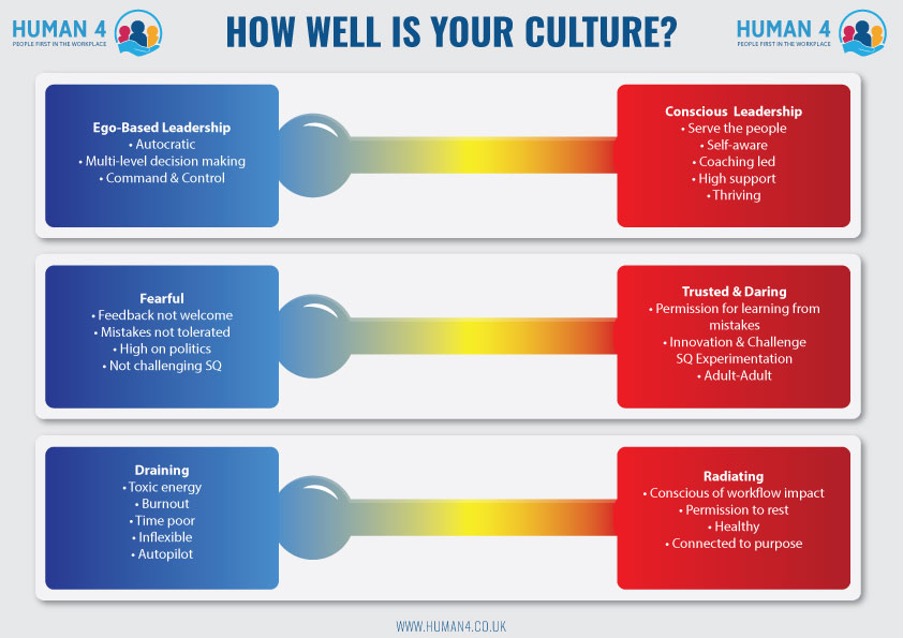
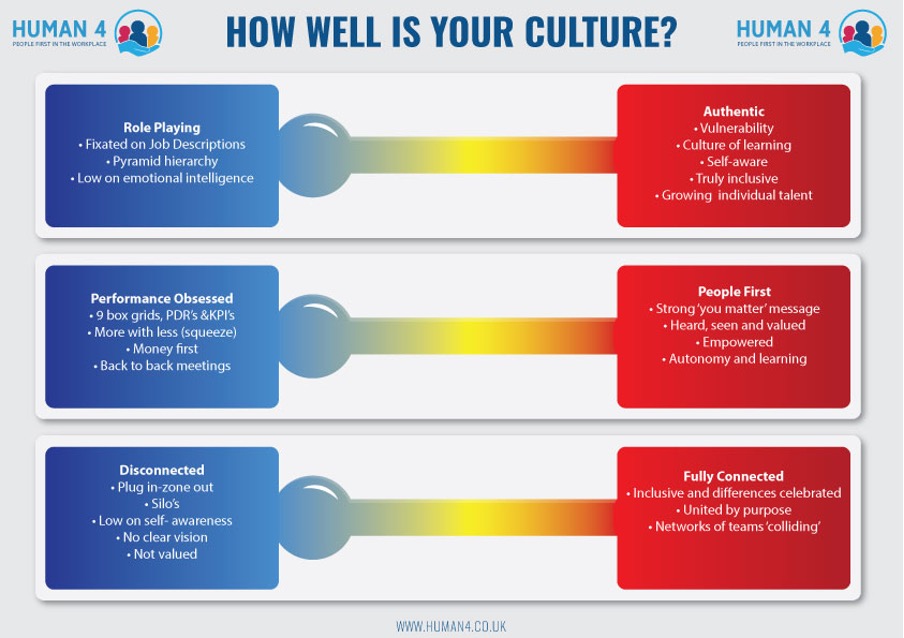
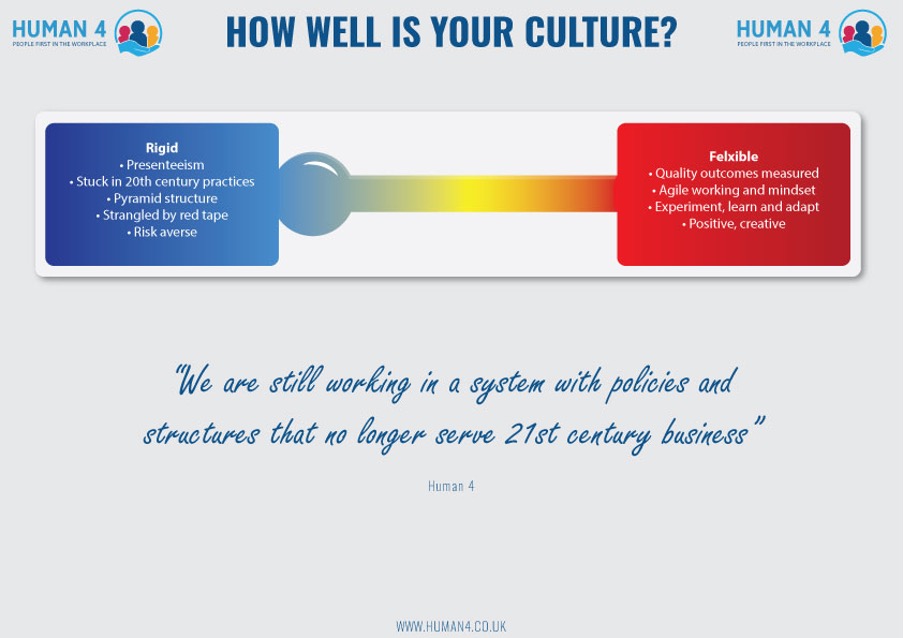

8. Nurturing Wellbeing and Performance
Wellbeing is vital to our performance. Not only do we need to look after our own physical, mental and emotional wellbeing, we need to look after our team members too. In this module participants will learn how to balance their own wellbeing as a positive role model to the team(s) they lead. We will explore how to find the right balance of eustress, managing distress and optimising performance. How to champion self- compassion over self-esteem and how to create a self-care routine that is integrated into the working day not just and out of hours nice-to-have.
Participants will gain an understanding of the individual nature of motivation and the key drivers of autonomy, mastery and purpose. They will look at how these translate into practical ways of working. How to co-create development plans with their teams that drive individual career aspirations and organisational success. We will then deep dive into cascading organisational purpose and vision.

9. Impacting your Organisation
Influence is now far more important than authority in contemporary leadership. With changing ways of working and different aspirations of emerging workplace generations and alternative structures based around projects and work-streams, job titles are becoming less relevant. We will explore individual influencing styles using a profiling tool. Participants can identify when and where push or pull factors are helpful in meeting own needs and those of stakeholders. We will explore what it takes to build relationships at pace.
Creating impact and inspiring others is key to leadership success. Understanding where the ship needs to go and being part of that steering. Anticipating future trends in workforce dynamics and where the business is headed. Participants will be guided in creating their personal brand and building credibility as a leader in championing the conscious workplace. They will also learn to become more seen, heard and valued for their conscious contribution.

10. Learning Review, Knowledge Gaps and Maintaining Momentum
This workshop is the opportunity to examine the learning journey to date. Participants will present back key learning points from each of the workshops. This will be followed by a facilitated discussion to identify knowledge gaps and creating a plan to fill these outside of the programme. A wealth of resources will be shared with them and learning routes signposted.
We will also ask participants to present their insight from the action learning groups and how this has helped in their journey of self-discovery. Participants will also be asked to share what they have learned about themselves as a person and a leader during the programme.

11. Creating your Personal Manifesto and Legacy
In this workshop participants will be trained to coach each other using a framework to guide the creation of a personal leadership manifesto. They will then record as short-form video to share with their line managers and teams as a milestone and commitment to evolving consciousness of their teams and the organisational culture.
We will then explore career ambitions and progress beyond current role and what it means to leave a legacy when you move role or organisation.

12. Developing a Process to Share Learning
In the final workshop of the programme participants will be guided to create a process to share learning and insights to their peers, colleagues and teams. The output will be 1 12-month action plan. The session will also be a final opportunity for Q&A and a celebration of successful completion of the programme.
Methodology
Conscious Leadership
Working closely with organisations over recent years I am increasingly seeing the negative impact of the great resignation, quiet quitting, the threat of burnout and record low levels of engagement. This is what gets me out of bed every day, I’m driven by a mission to transform workplace cultures by re-focusing the leader mindset and subsequent behaviours around a new leadership paradigm of raised consciousness, care and connection.
Having worked in business for over 35 years and having my own people and culture consultancy, I have gathered a wealth of insights, data, case studies and strategies where companies get leadership right for the post-covid, hybrid, AI age we are now living in. I have developed a methodology that combines insights from research, learning frameworks for creating transformation, self-insight tools, reflection methods and action learning.

1. Research
Conscious leadership is a relatively new concept, and there is ongoing research being conducted to understand its impact on organizational outcomes. Here are some of the recent studies on conscious leadership that will be used to inform content creation.
1. “The Conscious Leader: Exploring the Influence of Mindfulness on Leadership Effectiveness” by M. Lasater and J. Nielsen (2019) – This study examined the relationship between mindfulness and leadership effectiveness. The findings suggest that leaders who practice mindfulness exhibit greater emotional intelligence, empathy, and decision-making abilities.
2. “The Impact of Conscious Leadership on Organizational Performance” by P. King and P. Peterson (2019) – This study explored the impact of conscious leadership on organizational performance. The results suggest that organizations led by conscious leaders exhibit higher levels of employee engagement, job satisfaction, and overall performance.
3. “The Impact of Conscious Leadership on Employee Well-Being and Job Satisfaction” by S. K. Deane and M. P. Kempster (2020) – This study examined the impact of conscious leadership on employee well-being and job satisfaction. The results suggest that conscious leaders create a positive work environment, which leads to higher levels of employee well-being and job satisfaction.
4. “Conscious Leadership and Organizational Learning: A Qualitative Study” by C. C. F. Queiroz, R. C. L. Moura, and M. A. C. Carvalho (2021) – This study explored the relationship between conscious leadership and organizational learning. The findings suggest that conscious leaders promote a culture of learning and encourage their employees to share knowledge and ideas.

2. Frameworks
Various frameworks will be used as inspiration and applied throughout the programme. Some examples include:
The 5 leadership styles:
Autocratic, Democratic, Transformational, Laissez faire and Servant provide a useful context for discovering default style and the mindset shift required for more conscious leadership.
Coaching frameworks:
1. GROW Model: The GROW model is a simple and effective framework that helps coaches guide their clients through a four-step process that stands for Goal, Reality, Options, and Will. The GROW model helps individuals define their goals, assess their current reality, explore potential options and solutions, and create an action plan to achieve their goals.
2. OSKAR Model: The OSKAR model is a goal-focused framework that stands for Outcome, Scaling, Know-how, Affirm and Review. This model is particularly effective for helping coachees focus on their strengths, resources, and past successes. The OSKAR model helps individuals define their desired outcomes, scale their progress towards the outcome, identify their know-how and resources, affirm their progress, and review their progress.
3. Solution-Focused Coaching: Solution-focused coaching is an approach that focuses on identifying solutions to a problem rather than dwelling on the problem itself. This framework involves asking powerful questions to help individuals gain insight and clarity about their situation and explore new possibilities. Solution-focused coaching encourages individuals to focus on their strengths, resources, and past successes to find solutions that work for them.
4. Co-Active Coaching: Co-Active coaching is a holistic approach that focuses on the individual as a whole, rather than just their goals or challenges. Co-Active coaching involves building a partnership between the coach and the individual, which encourages them to explore their beliefs, values, and strengths. The goal of co-active coaching is to help individuals create a fulfilling and balanced life, in which they can achieve their goals and thrive in all areas of their life.
Brene Brown; Braving Trust – a framework to create deeper connection and trust within your team and with your peers.
Simon Sinek’s Golden Circle Framework to discover your core purpose.
Daniel Goleman’s model of emotional intelligence which identifies five main domains or components:
1. Self-Awareness: This refers to the ability to recognize and understand one’s own emotions, including their impact on behaviour, thoughts, and interactions with others.
2. Self-Regulation: This involves the ability to manage and control one’s emotions, particularly in response to challenging or stressful situations. It also includes the ability to delay gratification, think before acting, and remain calm under pressure.
3. Motivation: This refers to the ability to harness one’s emotions in the pursuit of goals, particularly long-term goals that require persistence and effort. It includes a sense of purpose, passion, and drive, as well as the ability to bounce back from setbacks and stay optimistic in the face of challenges.
4. Empathy: This involves the ability to understand and appreciate the emotions of others, and to respond in a sensitive and appropriate way. It includes the ability to read facial expressions and body language, listen actively and attentively, and show concern and compassion for others.
5. Social Skills: This refers to the ability to communicate effectively and build relationships with others, including the ability to work well in teams, negotiate, persuade, and lead. It also includes the ability to manage conflict, show empathy, and adapt to different social situations.
Culture Wellness Framework developed by my consultancy, Human 4 based on working with a wide range of organisations across 20 years.

3. Self-insight and reflection
Enneagram:
The Enneagram is a personality system that describes nine distinct types of people, each with its own set of core motivations, fears, and behaviours. The system suggests that each type has a unique worldview and personality structure that is shaped by their childhood experiences and patterns of thinking, feeling, and acting. The Enneagram is often used as a tool for personal growth and self-awareness, helping individuals understand their own patterns of behaviour and how they relate to others. The 9 archetypes are:
1. The Perfectionist or Reformer: Strives for perfection and is driven by a desire to do what is right and good.
2. The Helper or Giver: Strives to be loved and needed by others and seeks to be of service to those around them.
3. The Achiever or Performer: Strives for success and recognition and is driven by a desire to achieve and be admired.
4. The Individualist or Romantic: Strives for uniqueness and self-expression and is driven by a desire to be understood and appreciated for their authenticity.
5. The Investigator or Observer: Strives for knowledge and understanding and is driven by a desire to gain insights and expertise.
6. The Loyalist or Questioner: Strives for security and safety and is driven by a desire to feel supported and guided by others.
7. The Enthusiast or Epicure: Strives for excitement and new experiences and is driven by a desire to avoid pain and discomfort.
8. The Challenger or Protector: Strives for control and power and is driven by a desire to protect themselves and others from harm.
9. The Peacemaker or Mediator: Strives for harmony and peace and is driven by a desire to avoid conflict and maintain relationships.

4. Action Learning
Knowledge will be shared ahead of each module as pre-work to look at concepts relating to the module content in the form of articles, short videos and podcasts. This allows time for participants to cover some of the more theoretical concepts and ideas so that workshop time is focused on practical application and implementation.
Participants will be placed in action learning groups to work on a project that will benefit the organisation. These will be real business challenges for example, “How do we protect our organisation from losing talent?”, “What do we need in place to future proof our client relationships?” Participants will work together to solve the problem which will have a huge business benefit and they will also learn through the process and be able to apply the frameworks and insights from the workshops to create a conscious, effective, inclusive team, that plays to individual strengths. There will be live on-line forums and dedicated slack/what’s app groups for discussion and idea sharing.
5. Personal Journal/Workbook
Each participant will keep a learning journal for reflection and their personal development throughout the programme. This will also be used in reviewing progress with their Line Manager. They will also have a workbook to complete exercises through the programme to apply learning to real world situations.
Industries
This service is primarily available to the following industry sectors:

Travel
The global travel industry is a vital sector that has experienced significant changes in recent years, both positive and negative. The industry was severely impacted by the COVID-19 pandemic, resulting in significant losses in revenue and employment. However, as vaccination efforts continue and travel restrictions begin to ease, the industry is beginning to show signs of recovery.
In terms of the current state of play, the industry is still facing challenges as many countries still have restrictions on international travel. However, domestic tourism has seen some growth as people opt to travel within their own countries. Additionally, there has been a rise in alternative accommodations such as vacation rentals and camping, as people seek out safer, more socially distant travel options.
Looking towards the future, the travel industry is expected to rebound as vaccination rates continue to increase and travel restrictions are lifted. The demand for travel is expected to increase as people are eager to explore new destinations and make up for lost time. However, the recovery may not be immediate, as there are still concerns about new variants of the virus and the potential for future outbreaks.
The industry is also likely to see some changes in terms of how people travel and where they choose to stay. Technology will play a significant role in facilitating travel, with the use of apps and digital platforms becoming more widespread. Additionally, sustainability and eco-tourism are expected to become increasingly important as travellers become more conscious of their impact on the environment.
In conclusion, the global travel industry has faced significant challenges in recent years, but there is hope for a bright future as the industry adapts to new trends and technologies. While the recovery may not be immediate, the industry is likely to rebound as people resume traveling and exploring new destinations.

Media
The global media industry is a vast and diverse sector that encompasses everything from traditional broadcast media, such as television and radio, to digital media, such as social media platforms, streaming services, and news websites. The industry is constantly evolving due to technological advancements, changing consumer habits, and global economic and political factors.
Currently, the media industry is experiencing significant growth in the digital sector, with a shift towards online streaming services, such as Netflix, Amazon Prime Video, and Disney+. These platforms are challenging traditional cable and broadcast television by offering on-demand content that can be accessed from anywhere at any time. Social media platforms like Facebook, Twitter, and YouTube have also become powerful players in the media industry, with billions of users consuming and sharing content daily.
In terms of news media, the industry has been impacted by declining advertising revenues and the rise of fake news and disinformation. Many traditional news organizations are struggling to remain profitable and are exploring new business models, such as subscription-based services, to sustain themselves. The pandemic has also accelerated the shift towards digital news consumption, with more people turning to online news sources for up-to-date information.
Looking ahead, the future outlook of the media industry is heavily influenced by the ongoing development of new technologies and the changing habits of consumers. Artificial intelligence and machine learning are expected to play an increasingly important role in the media industry, from personalized content recommendations to automated news writing. Virtual and augmented reality technologies are also poised to transform the way media is consumed, with immersive experiences that blur the line between reality and fiction.
However, challenges such as content moderation, data privacy, and regulatory issues also pose significant challenges for the industry, with ongoing debates about the responsibility of media companies in ensuring a healthy information ecosystem. The future of the media industry is likely to be shaped by a balance between technological innovation and social responsibility.

Technology
The global tech industry is constantly evolving and shaping our world in profound ways. From the rise of smartphones to the widespread adoption of cloud computing, technology has fundamentally changed the way we live, work, and communicate.
As of 2021, the tech industry is a massive, trillion-dollar industry that encompasses everything from hardware manufacturing and software development to e-commerce, social media, and online entertainment. Some of the biggest players in the industry include tech giants like Apple, Google, Amazon, and Facebook, as well as a host of up-and-coming start-ups and smaller companies.
Currently, some of the biggest trends in the tech industry include the continued growth of cloud computing, the rise of artificial intelligence and machine learning, the increasing importance of cybersecurity and data privacy, and the proliferation of internet-connected devices in the form of the Internet of Things (IoT).
Looking to the future, many experts predict that the tech industry will continue to grow and innovate at an unprecedented rate. Some of the most exciting developments on the horizon include the widespread adoption of 5G wireless networks, the rise of quantum computing, and the increasing importance of virtual and augmented reality technologies.
However, with these exciting developments also come new challenges and concerns. As technology becomes ever more intertwined with our daily lives, issues like data privacy, cybersecurity, and the impact of tech on society as a whole are likely to become increasingly important.
Overall, the global tech industry is a rapidly evolving and dynamic sector that promises to continue shaping our world in profound and exciting ways in the years and decades to come

Management Consultancy
The global management consultancy industry is a vast and dynamic field, consisting of a diverse range of consulting firms offering a wide range of services to businesses and organizations around the world. The industry has been growing steadily in recent years, driven by increasing demand for consulting services across a variety of sectors and industries.
The current state of the industry is characterized by intense competition, rapid technological innovation, and changing client demands. Traditional consulting firms are facing pressure from new, technology-driven players, while clients are increasingly looking for more specialized, targeted services that can address specific business challenges.
In terms of market size, the global management consultancy industry is estimated to be worth around $250 billion, with the largest firms accounting for the majority of revenue. The industry is dominated by a small number of global players, such as McKinsey & Company, Boston Consulting Group, and Bain & Company, as well as a number of regional and niche firms.
Looking to the future, the management consultancy industry is expected to continue to grow, driven by factors such as globalization, technological innovation, and increasing demand for specialized services. However, the industry is also likely to face a number of challenges, including increasing competition from new entrants, changing client demands, and the need to adapt to new technological and market trends.
To stay competitive in this rapidly changing environment, management consulting firms will need to continue to innovate, expand their services, and adapt to the evolving needs of their clients. This may include developing new consulting methodologies, investing in new technologies, and building stronger relationships with clients through more personalized and customized service offerings.
Locations
This service is primarily available within the following locations:

New York, NY
New York City is one of the most populous cities in the United States, with a population of over 8 million people. It is a major economic and financial center, with Wall Street serving as the world’s largest financial hub. The city is also home to numerous Fortune 500 companies, including JPMorgan Chase, Citigroup, and American Express.
The tourism industry plays a significant role in the city’s economy, with millions of visitors coming each year to see iconic landmarks such as the Statue of Liberty, Central Park, and the Empire State Building. The city’s diverse food scene, world-class museums, and theaters also draw in tourists from around the globe.
New York City is also known for its retail and fashion industries, with Fifth Avenue serving as a hub for luxury shopping and high-end fashion. The city’s vibrant nightlife scene, with numerous bars, clubs, and theaters, also adds to its commercial appeal.
Overall, New York City’s population, economy, and commercial aspects make it a global hub for finance, tourism, and culture, attracting millions of visitors and businesses every year.

Chicago, IL
Chicago is a prominent city located in the state of Illinois, United States. As of my knowledge cut-off in September 2021, Chicago had a population of approximately 2.7 million people, making it the third-most populous city in the United States. The greater Chicago metropolitan area, which includes surrounding suburbs, is home to over 9.5 million residents, making it the third-largest metropolitan area in the country.
Chicago has a diverse and multicultural population, with a rich history of immigrants from various parts of the world, including Europe, Asia, Africa, and Latin America. The city is known for its vibrant neighborhoods, each with its distinct character and cultural influences.
Economically, Chicago is a major hub for business, finance, commerce, and transportation. It has a highly diversified economy that encompasses a wide range of industries such as finance, manufacturing, technology, healthcare, education, and tourism. The city is home to the Chicago Stock Exchange and numerous Fortune 500 companies, including Boeing, United Airlines, Archer Daniels Midland, and Caterpillar. The Chicago Mercantile Exchange and Chicago Board Options Exchange are prominent financial exchanges based in the city.
Chicago’s strategic location on the shores of Lake Michigan and its well-connected transportation infrastructure contribute to its significance as a transportation and logistics hub. The city has one of the busiest airports in the world, O’Hare International Airport, and a major cargo port, the Port of Chicago, facilitating trade and commerce.
The commercial landscape of Chicago is marked by a vibrant retail sector, with the Magnificent Mile on Michigan Avenue serving as a renowned shopping destination. The city boasts a wide array of retail outlets, ranging from luxury boutiques to department stores and local shops.
Tourism plays a crucial role in Chicago’s economy, attracting millions of visitors each year. The city is famous for its iconic landmarks such as Millennium Park, Navy Pier, Willis Tower (formerly Sears Tower), the Art Institute of Chicago, and Wrigley Field, home to the Chicago Cubs baseball team. Cultural attractions, including museums, theaters, music festivals, and culinary experiences, contribute to Chicago’s appeal as a tourist destination.

San Francisco, CA
San Francisco is a vibrant city located in California, United States. Known for its stunning natural beauty, diverse population, and thriving economy, it has a unique blend of cultures and a rich history. Here’s a summary of its population, economics, and commercial aspects:
Population: San Francisco is home to a diverse population. As of my knowledge cut-off in September 2021, the estimated population was around 883,305. The city has a reputation for being inclusive and welcoming, attracting people from various backgrounds and ethnicities. It has a significant LGBTQ+ community and is known for its progressive values.
Economics: San Francisco has a robust and diverse economy. It serves as a global hub for technology and innovation, with many leading tech companies and start-ups headquartered in the area. Major players like Google, Facebook, and Twitter have a strong presence in the city. The technology industry drives job growth and contributes significantly to the local economy. Additionally, San Francisco has a thriving finance sector, with numerous banks and investment firms operating in the city. Tourism also plays a vital role in the economy due to the city’s iconic landmarks and attractions.
Commercial aspects: The city offers a wide range of commercial opportunities. San Francisco has a bustling downtown area, with a mix of office buildings, retail spaces, and entertainment venues. The downtown district includes the Financial District, where many financial institutions are located. The city has vibrant neighborhoods with unique commercial districts, such as Union Square, known for its upscale shopping, and the Mission District, which offers a blend of independent boutiques, cafes, and cultural establishments. The city’s diverse culinary scene is also noteworthy, with numerous restaurants and food trucks offering a variety of cuisines.
San Francisco is known for its entrepreneurial spirit, attracting start-ups and fostering innovation. The city hosts numerous tech conferences, networking events, and incubators, creating an environment conducive to business growth and collaboration. Additionally, San Francisco has a strong commitment to sustainability and green initiatives, which is reflected in its commercial practices.

Miami, FL
Miami is a vibrant city located in the south-eastern tip of Florida, United States. Known for its beautiful beaches, lively nightlife, and diverse culture, Miami is a major economic and commercial hub. Here’s a summary of its population, economics, and commercial aspects:
Population: Miami is a densely populated city with a diverse population. As of my knowledge cut-off in September 2021, the estimated population was around 463,347. The city attracts people from various backgrounds, including a large Hispanic and Latino population, contributing to its multicultural atmosphere.
Economics: Miami has a strong and diverse economy. It serves as a regional center for finance, commerce, and international trade. The city’s strategic location, proximity to Latin America, and well-developed transportation infrastructure make it a gateway for business opportunities in the Americas. Major industries in Miami include finance, tourism, hospitality, real estate, healthcare, and international trade. The city also has a growing presence in technology and entrepreneurship, with emerging start-ups and innovation hubs.
Commercial aspects: Miami offers a wide range of commercial opportunities. The city has a bustling downtown area, featuring a mix of office buildings, hotels, and retail spaces. Brickell, located in downtown Miami, is known as the city’s financial district, housing many national and international banks, investment firms, and corporate headquarters. Miami’s vibrant neighborhoods like Wynwood and the Design District are renowned for their art galleries, boutique shops, and trendy restaurants, attracting both locals and tourists.
Miami is a popular tourist destination, with its beautiful beaches, luxury resorts, and vibrant entertainment scene. The city hosts numerous conventions, trade shows, and cultural events, contributing to its thriving tourism industry. Additionally, Miami has a strong international business presence, with an active port and an emphasis on global trade, especially with Latin America and the Caribbean.

London, UK
London is the capital city of the United Kingdom, with a population of over 8 million people. It is a major economic and financial center, with the London Stock Exchange being one of the largest stock exchanges in the world. The city is also home to many international corporations and is a hub for fintech and start-ups.
Tourism is a significant part of London’s economy, with visitors coming to see iconic landmarks such as the Tower of London, Buckingham Palace, and the British Museum. The city’s world-renowned theater scene, including the West End and Shakespeare’s Globe, also attracts visitors from around the globe.
London is also a hub for retail and fashion, with famous shopping areas like Oxford Street, Bond Street, and Knightsbridge. The city’s nightlife is also well-known, with numerous bars, pubs, and clubs.
In recent years, London has also become a major center for technology, with many global tech companies opening offices in the city.
Overall, London’s population, economy, and commercial aspects make it a global hub for finance, tourism, culture, and technology, attracting businesses and visitors from all over the world.
Program Benefits
Human Resources
- Improve engagement
- Talent attraction
- Talent retention
- Reduce absenteeism
- Raise morale
- Mitigate burnout
- Reduce conflict
- Enhance EVP
Leadership
- Consistent approach
- Raise E.I.
- Increase empowerment
- Increase accountability
- Release potential
- Greater resilience
- Reduce egocentricity: ‘we’ not ‘I’
- Personal growth
Organization
- Thriving culture
- Better client relationships
- Improve service
- Increase agility
- Enhance reputation
- Strong ‘People with profit’ message
- Increased responsiveness
- Less reactivity
- Inclusive culture
Testimonials

Testimonial 1
Content here…

Testimonial 2
Content here…

Testimonial 3
Content here…

Testimonial 4
Content here…

Testimonial 5
Content here…
More detailed achievements, references and testimonials are confidentially available to clients upon request.
Client Telephone Conference (CTC)
If you have any questions or if you would like to arrange a Client Telephone Conference (CTC) to discuss this particular Unique Consulting Service Proposition (UCSP) in more detail, please CLICK HERE.












